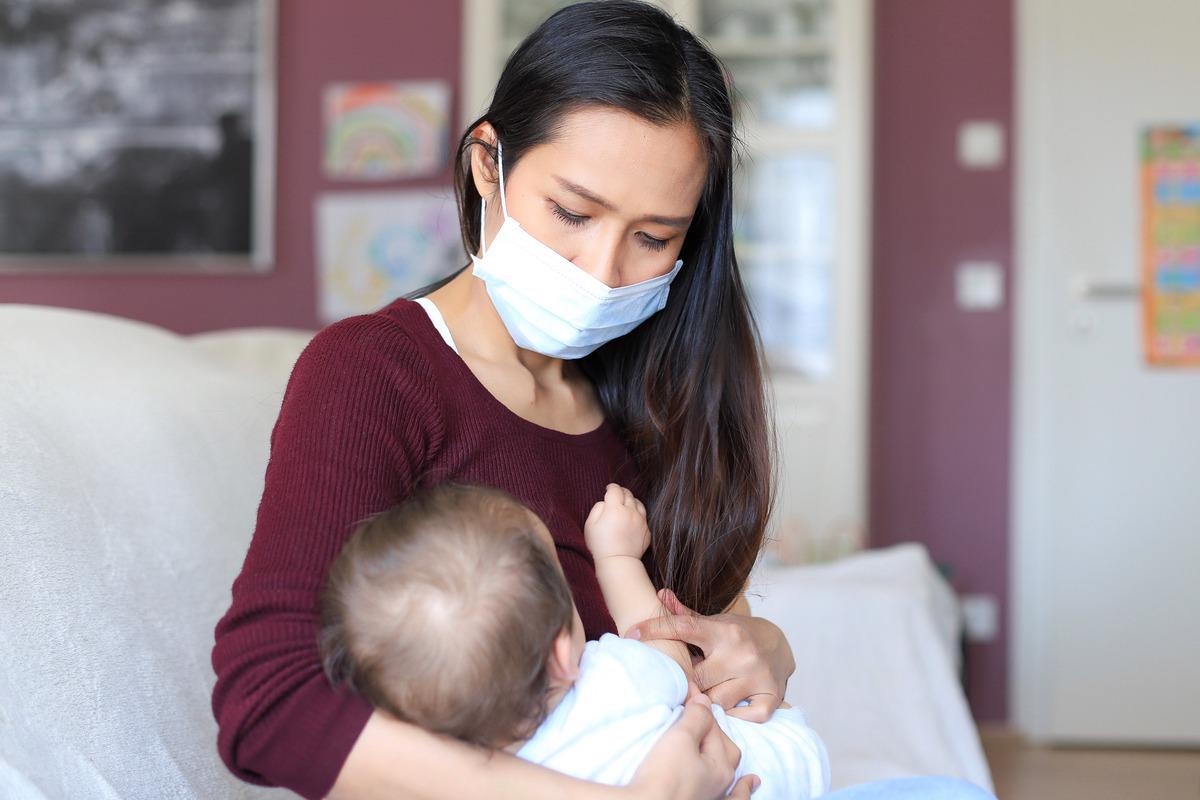New research suggests that prenatal coronavirus disease 2019 (COVID-19) exposure increases the risk for neurodevelopmental disorders in the baby’s first year of life. The risk of neurodevelopmental disorders increased if COVID-19 infection occurred in the third trimester. The majority of diagnosed neurodevelopmental disorders involved motor and language problems.
Because children born to previously infected mothers during the pandemic are all under 2 years old, it is still unknown how severe acute respiratory syndrome coronavirus 2 (SARS-CoV-2) exposure affects long-term development. Longitudinal studies are needed to confirm the full extent of COVID-associated neurological effects, the results suggest pregnant people should take precautions in avoiding the severe acute respiratory syndrome coronavirus 2 (SARS-CoV-2).
 Study: Neurodevelopmental outcomes at one year in offspring of mothers who test positive for SARS-CoV-2 during pregnancy. Image Credit: Onjira Leibe/Shutterstock
Study: Neurodevelopmental outcomes at one year in offspring of mothers who test positive for SARS-CoV-2 during pregnancy. Image Credit: Onjira Leibe/Shutterstock
The study was recently published in the medRxiv* preprint server whilst it undergoes peer review.

 This news article was a review of a preliminary scientific report that had not undergone peer-review at the time of publication. Since its initial publication, the scientific report has now been peer reviewed and accepted for publication in a Scientific Journal. Links to the preliminary and peer-reviewed reports are available in the Sources section at the bottom of this article. View Sources
This news article was a review of a preliminary scientific report that had not undergone peer-review at the time of publication. Since its initial publication, the scientific report has now been peer reviewed and accepted for publication in a Scientific Journal. Links to the preliminary and peer-reviewed reports are available in the Sources section at the bottom of this article. View Sources
How they did it
The researchers collected medical records from hospitals and medical centers in Massachusetts to identify people who gave birth between March and September 2020 and who had a history of COVID-19 illness. Since SARS-CoV-2 has disproportionally affected minorities, the researchers also collected race and ethnicity data to control for other outside factors that could explain the results.
A SARS-CoV-2 diagnosis during pregnancy was confirmed with a record of a positive PCR test result. The researchers categorized the timing of exposure with a person’s trimester. Individuals without a positive PCR test were considered negative for the study.
The researchers also accounted for other extraneous factors such as maternal age, public versus private insurance, the biological sex of the child, and preterm status.
Characteristics of mother and child
In total, the researchers included 7,772 live births from 7,466 pregnancies in their analysis. The average age of the mother was 32.9 years, with 69% being Caucasian.
Of the 7,772 births, 222 mothers were infected with SARS-CoV-2 during pregnancy (2.9%).
Exposed mothers were significantly less likely to be of white or Asian race. In contrast, most infections occurred in mothers of Hispanic ethnicity. Additionally, mothers who were infected were more likely to have public insurance.
Preexisting conditions such as diabetes and hypertension were similar across exposed and unexposed mothers and exposed mothers were more likely than unexposed mothers to have a preterm delivery (14% vs. 8.7%).
Findings
Babies from exposed mothers were more likely to receive a neurodevelopmental diagnosis within the first year of life. Specifically, 6.3% of babies had a diagnosis compared to 3% of unexposed babies.
The most common neurodevelopmental diagnoses included specific developmental disorders of motor function, expressive language disorders, and developmental disorders of speech and language.
Babies born to exposed mothers tended to receive their diagnosis two months earlier than babies from unexposed mothers (214 days vs. 275 days).
The risk for neurodevelopmental disorders increased if SARS-CoV-2 infection occurred during the third trimester of pregnancy.
There was a greater risk of preterm delivery when there was a SARS-CoV-2 infection during pregnancy. However, further analyses showed a lack of association between preterm birth and neurodevelopmental diagnoses though the researchers note that further follow-up studies are needed since severe COVID-19 illness may contribute to neurological issues.
Of note, given the known association between severe COVID-19 in pregnancy and increased risk for preterm birth, those excluded in this sensitivity analysis are theoretically the individuals most at risk for adverse neurodevelopmental programming based on the proposed mechanism,”
explained the researchers.
Limitations
Because the researchers are unable to observe SARS-CoV-2 prenatal exposure during one’s teenage or adult years, there is always a possibility that neurodevelopmental effects may emerge later on in life. For instance, all babies born during the pandemic are under the age of 2 which is too young to diagnose autism.
There is also a chance of ascertainment bias as exposed mothers may be more concerned over the long-term risks of SARS-CoV-2 and seek evaluation from a doctor.
Lastly, the rate of COVID-19 infections during pregnancy was much lower than other areas reported in the United States. This may reflect the researcher’s decisions to include smaller and community hospitals in addition to urban academic medical centers.

 This news article was a review of a preliminary scientific report that had not undergone peer-review at the time of publication. Since its initial publication, the scientific report has now been peer reviewed and accepted for publication in a Scientific Journal. Links to the preliminary and peer-reviewed reports are available in the Sources section at the bottom of this article. View Sources
This news article was a review of a preliminary scientific report that had not undergone peer-review at the time of publication. Since its initial publication, the scientific report has now been peer reviewed and accepted for publication in a Scientific Journal. Links to the preliminary and peer-reviewed reports are available in the Sources section at the bottom of this article. View Sources